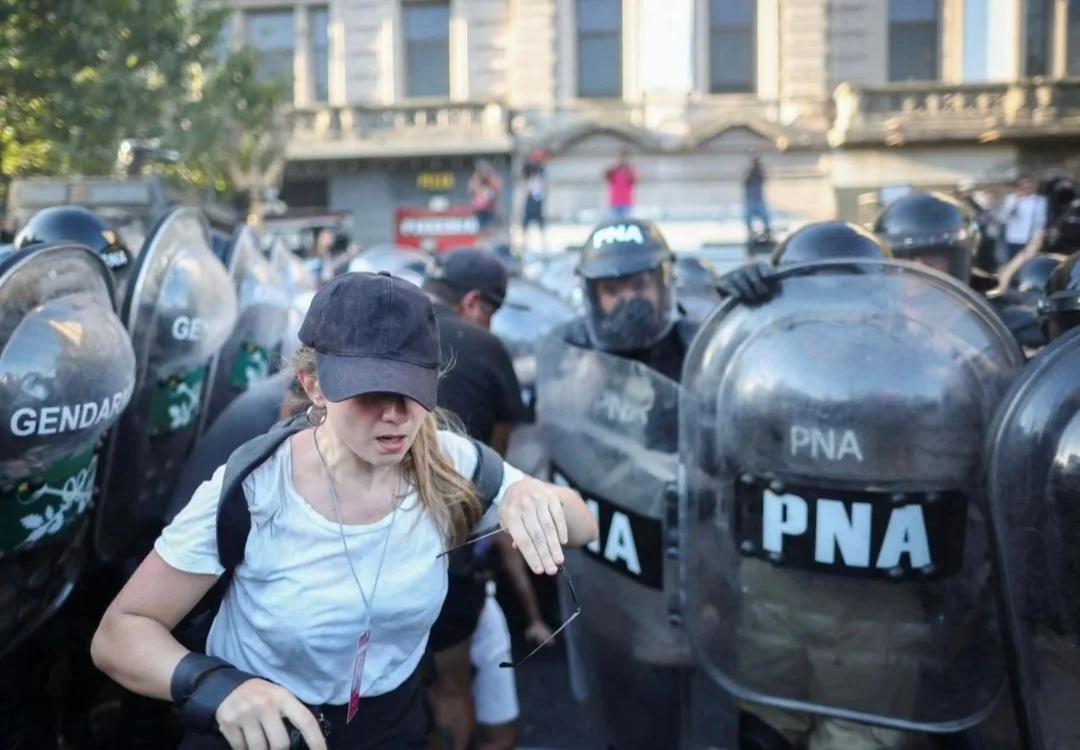Argentina: 19 Women Expose Decades of Abuse by Infamous Journalist Pedro Brieger
At least 10 of the women worked as journalists when Brieger sexually assaulted them
Location: Argentina, Buenos Aires
Date: July 2, 2024Women Press Freedom stands unequivocally with the 19 courageous women who have bravely come forward to expose the abhorrent sexual harassment perpetrated by political commentator Pedro Brieger. The detailed testimonies presented by Periodistas Argentinas reveal a horrifying pattern of abuse spanning three decades. Brieger’s actions are a gross abuse of power, mirroring the infamous misconduct of Harvey Weinstein, and highlight a systemic failure to protect victims and hold perpetrators accountable. Brieger’s abuse is criminal. His repeated acts of sexual harassment and assault against at least 10 journalists and other women are inexcusable and must be met with the full force of the law. These women, including Cecilia Guardati, Leticia Martínez, Julia Kolodny, Agustina Kämpfer, Marcela Perelman, and Gisela Busaniche, have shown immense courage by speaking out despite the significant personal and professional risks involved. For years, Brieger used his position of power to silence his victims, ensuring that their voices went unheard and their pain unacknowledged. This systematic abuse and the subsequent cover-up by institutions that should have protected these women is a damning indictment of the media industry’s failure to address sexual harassment. The suspension of Brieger by Grupo Indalo is a necessary first step, but it is far from sufficient. We demand that the women’s voices are now heard, their experiences validated, and justice delivered. Sexual harassment and the abuse of power are intolerable, and it is imperative that those who commit such crimes are prosecuted to the fullest extent of the law.
“I was working when I felt him grab my neck and then put his hand inside my sweater and start touching me,” a journalist, part of 19 women exposing well-known journalist Pedro Bieger’s sexual assault, recounts. “I felt disgusted and humiliated. I immediately got up, went to the newsroom, and told my colleagues, who responded by laughing.”
On July 8, a group of Argentine journalists, including Cecilia Guardati, Leticia Martínez, Julia Kolodny, Agustina Kämpfer, Marcela Perelman, and Gisela Busaniche, filed a formal complaint against prominent journalist Pedro Brieger, sharing incidents of sexual harassment spanning three decades. The testimonies presented by Periodistas Argentinas detail 19 cases involving colleagues and students from various institutions.
Cecilia Guardati recalled how Brieger invited her to his room to bring her an audio recording, but “when I entered his room he was naked in his bed masturbating." Leticia Martínez said that she went to interview him on AM750 radio and that, after the interview, Brieger "masturbated" in front of her "despite requests not to do so." In 2019, the gender columnist on Radio 10, Julia Kolodny, resigned because she experienced sexual harassment by her then manager Brieger through "persistent inappropriate comments and behaviors.”
Agustina Kämpfer, one of the accusers, emphasized the need for institutional change and support for the victims, noting that many cases become "injustice without redress."
"These inappropriate behaviors happened over 30 years," said Kämpfer. "He was our professor, colleague, boss, neighbor, and harasser. We had to abandon theses, move, resign, and avoid conferences just to not see him again. He traveled the world, received awards, hosted programs, and lived wherever he wanted for as long as he wanted. His professional prestige masked his perversion."
Another woman shared a harrowing account of Brieger's actions: "He didn't stop even when I was paralyzed with fear."
Periodistas Argentinas has called for public apologies from Brieger and urged the government to fund institutions addressing workplace harassment and to launch more prevention campaigns in media organizations. They also advocated for legislation to tackle grievances in academic and professional environments.
Brieger, a columnist on international issues for Radio10 and C5N, has had his roles suspended by Grupo Indalo, which owns both media outlets. However, no official statement has been released by the organizations.
The initial allegations surfaced on June 23 when journalist Alejandro Alfie published the accounts of five women accusing Brieger of sexual harassment.
"Pedro Brieger was in a position of power, able to take away jobs and opportunities, often targeting women much younger than himself," reiterated Pazos. "We consider it essential that Pedro Brieger issues a public apology to all affected."
The group expressed frustration at previous attempts to report the harassment, which they say went unheard. "It's the first time we're getting the attention we deserve. No one wanted to listen before, even though we warned our bosses and colleagues and spoke about it on television," Kämpfer added.
The expose of the nineteen women illustrates a pattern of explicit misconduct and abuse of power by Brieger. The dismissal of their initial reports of harassment is a grave injustice that must be rectified. His esteemed professional status concealed his depravity, allowing him to evade justice for far too long. Brieger, like Weinstein, wielded his influence to exploit women, stifle dissent, and escape justice. Public apologies from Brieger are merely a start; he must face substantial legal consequences.
Women Press Freedom vehemently condemns not only Brieger's despicable actions but also the institutions complicit in enabling his behavior. Media organizations that neglected to take decisive action must be held accountable. While Brieger's suspension by Grupo Indalo is a necessary measure, it is insufficient. We demand a thorough investigation into Brieger’s conduct and the systemic failings that permitted his abuse.
The Argentine government must allocate resources to institutions combating workplace harassment, initiate extensive preventive measures in media organizations, and enact robust legislation addressing grievances in professional and academic settings.
Women Press Freedom further implores media organizations to undertake immediate and transparent actions against those who commit sexual harassment and to create safe, respectful work environments. This battle against egregious violations continues, and we remain steadfast in advocating for the rights and safety of all journalists, particularly women, who endure such horrific abuse.
Sexual harassment and power abuse must be eradicated from our societies, and perpetrators must face stringent legal repercussions.
You can read a translation of the full report here:
The Culture of Harassment: A Turning Point
Background
In 2010, journalist Agustina Kämpfer publicly stated on a television program that journalist Pedro Brieger, the recent winner of the Martín Fierro Award, was “a harasser.” No one listened. She was referring to a public figure who had accumulated positions and prestige in the journalistic and academic fields.
Fourteen years later, following a note by Alejandro Alfie about a labor lawsuit that Brieger had won, journalist Cecilia Guardatti commented on the social media post of that news: she denounced his harassing behavior. This time, someone listened. Alfie published a series of tweets after investigating, citing five cases of professionals affected by Brieger’s behavior. Silence was broken from that publication.
Three Decades of Silence
The following report is the result of meetings held by Periodistas Argentinas with 19 affected individuals. We listened to their testimonies and shared their tears, helplessness, and shame. We tried to reflect on what each story was weaving. A way of acting that had managed to leave each and every one speechless and without answers: journalists, academics, students, an employee, a neighbor. Thus, questions began to arise, which we also share in this report, with the conviction and hope that the time has come to socially construct the answers.
The objective of this report is not to publicly shame. It is motivated by the need to end the culture of harassment, which this case reveals in all its complex dimensions. It embodies a person but also exposes the institutional responsibilities of public and private media, public and private academic institutions, and all contexts and people who silenced and normalized these intolerable violences. And this is the first point we want to highlight: the affected individuals lost tangible things.
The abusive machinery not only subjects but also strips away.
The Testimonies
Testimony 1
Year: 1995
Scene: University of Belgrano
Affected: Administrative Employee
Situation: “Brieger called the University of Belgrano, asking for one of the Faculty authorities. As she wasn’t available, he told the secretary: ‘I’m at home, in shorts, flip-flops, on a very comfortable couch, and with my (...) very hard.’ He then said a series of obscenities. The secretary hung up the call, but Brieger called back several times that day, so she spoke with the dean and the department director, who intervened, called Brieger, and told him he had to resign from his teaching position. According to people close to the secretary, she lived in fear for a long time, to the point of changing her daily route to get to the university.”
Testimony 2
Year: 1996
Scene: Building where Brieger lived
Affected: Neighbor
Situation: “We lived in the same building in Belgrano. I lived on the ground floor, he a few floors above. Whenever we crossed paths, he looked at me lustfully. One day I took the elevator to the rooftop to hang clothes. He had just entered the building and rode up with me. He immediately expressed that every time he saw me leave with my bike, it turned him on seeing my butt on the seat. Then he unzipped his pants and pulled out his penis. I didn’t know what to do. I returned to my house scared and frozen, left the basket, and went to some neighbors’ house to tell them what had happened. They knocked on his door, but he didn’t respond. My neighbors suggested I report it. On my way to the police station, I encountered a street policeman and asked for help: 'It’s your word against his: don’t even bother,' he said. Watching every side whenever I had to enter or leave the building was driving me crazy. I borrowed money because I didn’t have a penny (raising two children alone) and moved as soon as I could.”
Testimony 3
Year: 1996
Scene: Conference
Affected: Student
Situation: “I was 21 years old, a third-year student at TEA (Taller Escuela Agencia), had taken International Politics with him, and worked on the research for one of his books without payment. In August or September that year, he invited me to a conference by Spanish writer Juan Goytisolo at Fundación Los Cedros, very close to the faculty, so we walked there from TEA. During the walk, he made comments about the clothes I was wearing, asked if I had a boyfriend, etc. While we waited for the event to start, he suddenly whispered, 'How I would take down your panties and spank you.' I was absolutely paralyzed, mute, not knowing what to do. The entire conference passed, and I didn’t move. There was then a cocktail, where I distanced myself from him as much as possible until he said, ‘Shall we go?’ I told him no, that I would stay. I waited a while and left, looking all around, terrified he might be on the street or hiding somewhere. He kept calling my house (it was the era of landlines), and I tried not to answer, but once I did, and he asked why I wasn’t talking to him anymore. I remember saying, 'You know why,' and he pretended not to understand. I don’t remember if it was that call or another, but he invited me to a meeting one night at his house with people who weren’t in a relationship. I obviously declined. That was my last communication with him. I decided not to pursue international politics, something I was passionate about, to never see him again.”
Testimony 4
Year: 2001
Scene: Master’s program at the National University of La Plata
Affected: Student
Situation: “I am an economics graduate, but I have always been interested in the Middle East. In the late 1990s, I researched which master’s program I could enroll in. My boyfriend (now the father of two of my children) was taking the Middle East course at the Faculty of Social Sciences at UBA. That’s how I met him. I spoke with him and decided to start the International Relations master’s program at UNLP, where he was a teacher. I traveled from La Plata to CABA by bus. One Saturday, we shared the journey. We sat together. Out of nowhere, he leaned over to kiss me. I was frozen. I cried. All I remember is saying, ‘You know my boyfriend.’ I don’t remember how the trip continued or how I got home. I never returned to the master’s program. I lost time, money, and, most importantly, my dream of studying what I was passionate about.”
Testimony 5
Year: 2001
Scene: Job proposal meeting
Affected: Former student
Situation: “He had been my teacher, and I chose him to hand me my diploma. It was a mentoring relationship. We met for a job proposal in a café in Barrio Norte. He never mentioned the job. At one point, out of context, he asked, 'Are you as guilty in bed?' I felt very uncomfortable, remained immobile and silent, mostly looking at the floor. For an hour, he talked about how he masturbated thinking about how I sat in class and the clothes I wore at the diploma ceremony. He told me he had a different way of living sex because he had lived in a kibbutz, narrated an initiatory situation in a tent where he discovered he enjoyed watching others have sex and masturbate. All this was a nonstop monologue. At one point, he asked: ‘What would you like more, touching yourself for me to watch or watching me touch myself?’ ‘Maybe I’m not interested in anything you’re saying.’ ‘So why did you say "maybe"?’
That response made me angrier because I realized he was also trying to manipulate me. I said goodbye and left. I ran. At home, I wrote down everything that had happened. I still have it. A few days later, I sent him an email telling him never to speak to me again, accusing him of abuse of authority, the age difference, and that the job proposal had turned into subjecting me to his sexual monologue. His exhibitionism had caused me paralysis and disgust. He did not respond in writing, but he tried to contact me insistently for weeks. We never spoke again.”
Testimony 6
Year: 2001
Scene: TEA
Affected: Student
Situation: “I was studying journalism at TEA when I had him as a professor of International Politics. In every class, he stood in front of me and harassed me with his looks: systematic, repeated, and explicit throughout the class: his gaze moved from my crotch to my breasts and then my eyes; and then back down to start again. I was worried about keeping my knees very close together all the time, watching how I dressed on the days I had his class. My classmates began to think we had an intimate relationship because he conveyed that: he would approach to whisper inappropriate, disgusting things in my ear, but in front of everyone. I had a terrible time and had two of the three weekly classes with him.”
Testimony 7
Year: 2003
Affected: Journalist
Situation: “He was my professor at TEA in the early 2000s and then the first journalist who gave me a job. In the following years, already a well-known and respected figure, he opened doors that helped me start my career as a journalist specializing in international issues. Working together, when we were alone, he often made sexual comments unrelated to the conversation. I always tried to change the topic, but he continued. The rudest instance was one night when I drove him to his house in my car, and he persistently asked about my sexual preferences. I was in my early twenties, and he was twice my age. I froze, didn’t know what to say, and was terrified the situation would escalate. I don’t remember well how I got out of that moment, but I do know that from then on, I tried not to be alone with him, and gradually distanced myself from that professional relationship. For decades, I felt ashamed to acknowledge it, both to others and to myself.”
Testimony 8
Year: 2005
Scene: TV Pública
Affected: Journalist
Situation: “I was a writer for the evening newscast and Vision 7 International. We had a friendly relationship until one day, when I was alone in control, he came in and stood behind the chair I was sitting in. I was working when I felt him grab my neck and then put his hand inside my sweater and start touching me. I felt disgusted and humiliated. I immediately got up, went to the newsroom, and told my colleagues, who responded by laughing.”
Testimony 9
Year: 2005
Scene: International Coverage
Affected: Journalist
Situation: “I was 25 years old and worked at TV Pública. They sent me to Mar del Plata to cover the ALCA Summit and provide him with journalistic assistance. At the start of the trip, on the bus, he talked about how happy he was to work with me. He began touching my thighs whenever he could, my neck and back, around the waist. He also had a habit of talking to me up close, very close, until I could feel his breath. I moved away, but he came closer again. From the first day, he invented that we owed each other a dinner, and from the start of the work, he didn’t stop saying how nice it would be to have dinner together. At that time, we used walkie-talkies, and he would say inappropriate things and insist on having dinner. He also asked me to go to his room. I don’t remember what excuses I made not to go. I realized he wouldn’t stop.
I remember the feeling of wondering why he was doing this. At one point, I mustered the courage to say, 'Enough.' He didn’t even flinch. I felt like his prey. On one hand, I was fulfilling my dream of being a journalist, and on the other, I was living a nightmare. It was so unbearable that I decided to ask for help. It was midnight, and he kept saying things through the walkie-talkie. I put it on speaker and asked my chief producer to listen. She couldn’t believe it. I told her that despite having important notes the next day, I wanted to leave the coverage because he wouldn’t stop. She spoke with my director. I don’t remember what excuse we gave, and I’m not even clear why we didn’t tell the truth.
I paid for my return trip and left. Later, when I ran into him at the channel, I avoided him. And he pretended not to know me. I was scared, ashamed; I wanted to forget it, but I never could.”
Testimony 10
Year: 2006
Scene: Admission to the Doctorate in Social Sciences, UBA
Affected: Student
Situation: “I applied for the Doctorate in Social Sciences with a Conicet scholarship. Having specialized in the Middle East, I asked him to be my advisor. Since I am from Rosario, most of the communication was via email, and in cordial terms. We arranged a meeting in Buenos Aires for him to sign the doctoral papers. I don’t remember which bar, but when I arrived, he started asking me about my sexual fantasies. When I refused to talk about it, he began telling me he wanted to have sex on a plane and liked people watching. He recounted an encounter in a hotel with a woman, where a cleaner saw them, and it excited them more. I was frozen and sweating with terror. I left the bar and got into a taxi crying.
I didn’t enter the doctorate, and I never wrote to him again.”
Testimony 11
Year: 2006
Scene: Radio Nacional
Affected: Journalist
Situation: “I was 33 years old and in charge of the magazine of a civil association, as the editorial secretary. I contacted him for an interview. The meeting was at Radio Nacional. At first, everything was cordial. We entered a very small room with only a table and a chair at each end. I asked my list of questions, and at the end, I asked if he wanted to add anything I hadn’t asked. Immediately, he made an allusion to my body. I was taken aback, pretended not to have heard, and asked again, 'Do you want to add anything I haven’t asked?' He repeated the same thing. I ended the interview, returned to work, and told my colleagues, who said not to exaggerate, that it was just a compliment.”
Testimony 12
Year: 2007
Scene: Palacio San Martín, Argentine Foreign Ministry
Affected: Student and Member of the Islamic Community
Situation: “I was 25 years old and had graduated with a degree in Political Science from UBA two years earlier. I come from a family of Muslims originally from Syria. By that year, I was collaborating with a Turkish foundation, which I later came to direct. At that time, dinners were held at the Foreign Ministry, attended by representatives of the Islamic world in Argentina. One of those nights, I led the event, and that’s why I was seated at the main table. He sat next to me. We exchanged words, I talked about my academic interests, and out of nowhere, he leaned in and said in my ear, 'Muslim women here are so beautiful... like you!' It seemed like an inappropriate comment. My mother was sitting next to me. At the end of the night, he gave me his email and told me to write to him about my academic research. I did. The response was much worse than the dinner comment. He asked how Muslim women had sex, told me his sexual preferences, and invited me to meet him. I never replied to the email. I always wondered what I had done to make him act so inappropriately... I felt stupid and guilty.”
Testimony 13
Year: 2008
Scene: International Politics Conference
Affected: Journalist
Situation: “I have been working as a correspondent in the Middle East and Asia for years, covering news from the scene. As the director of a course for correspondents, I invited him to give a talk. After the conference, we went to lunch. Immediately, he began asking if I masturbated, telling me I didn’t look well, that he was sure my boyfriend didn’t satisfy me, and talking about his sexual inclinations. I told him I wasn’t interested in discussing any of that, but he didn’t stop. After that incident, he started sending me messages. 'Did you do your homework?' he would ask. He referred to what he had said during that lunch: if I had masturbated in front of the mirror. I suffered abuse in my childhood, and that situation broke me so much that I still feel the pain of the humiliation in my body, in my bones, for not having been able to stop him more decisively.”
Testimony 14
Year: 2008
Scene: International Coverage
Affected: Journalist
Situation: “I arrived in Tunisia with one of my bosses from Télam to cover the trip of then-President Cristina Kirchner. There, I met Brieger, who was part of the delegation. We had tea with cookies in the hotel lobby and discussed professional topics. The next day, he said he couldn’t attend the meeting with the president, asked me to share the audio with him, and gave me his room number. I went up with my computer in hand to give him the audio as a colleague’s favor. When I arrived at his room, I saw the door slightly open. I found him naked, reclining against the headboard, covering himself with a sheet, masturbating while talking to me. I don’t remember how long I stayed there or what he said. I left and never spoke to him again.
At that moment, I didn’t tell my boss; it wasn’t a comfortable context to talk about something like that. 99% of the delegation were men. I kept working as a defense mechanism. I blocked it out. I denied it. Time passed, and he appeared everywhere. I saw him winning awards and gaining more visibility and power. I was afraid to show my face and expose myself.”
Testimony 15
Year: 2010
Scene: Radio AM 750
Affected: Student and journalist
Situation: “I was 25 years old, taking my first steps in journalism. He was much older than me and a reference in international issues. When I introduced myself, I told him I wanted to dedicate myself fully to international journalism and that I would like him to consider me if he had any job openings. He said he didn’t have anything concrete to offer but that I could help him with news about Syria, which I started doing without pay. This unpaid work lasted for a few months, and at the same time, I took his Sociology of the Middle East course (UBA). One day, I went to interview him for a digital portal where I worked. He arranged to meet at the cultural center Caras y Caretas, where he did his radio show on AM750. We went to the hall, and while I was interviewing him, he started masturbating right there, in front of me, while I begged him to stop. There were people nearby, but he didn’t care. It took me years to understand that it wasn’t my fault.”
Testimony 16
Year: 2010
Scene: TV Pública
Affected: Journalist
Situation: “I contacted him for an interview. I was surprised by his immediate response to my email since it was a Saturday night. I was even more surprised by the tone of his email: he called me ‘little sheep’ (the magazine was called Oveja Negra), asked what I was doing on a Saturday night, and requested photos. I mentioned this in a summary meeting with the magazine’s editorial team. They offered to cancel the interview or accompany me. I felt both proposals undermined my ability to handle difficult situations. I asked the publication’s photographer, who was aware of everything, to accompany me.
The interview was held at TV Pública, where he was an international columnist for the evening news. At the beginning, everything was normal until we reached the dressing room. He made me enter and closed the door in the photographer’s face. He took off his pants, remaining in his underwear, shirt, and tie. His large underwear had an opening in the front, which he opened further to show me his penis. I was frozen, pressed against the door, holding the doorknob. I couldn’t react. When we left the building, I told my photographer colleague what had happened, and he said, 'How inappropriate.'”
Testimony 17
Year: 2011
Scene: Faculty of Social Sciences, UBA
Affected: Teaching assistant and student
Situation: “I met him as a student in his Sociology of the Middle East course at the Faculty of Social Sciences, UBA. Later, I became a teaching assistant in the same course. Over time, I also began doing some freelance work for him.
I experienced two clear situations that made me uncomfortable and that only now, in 2024, I can identify as sexual harassment. The first was one day when I ran into him in the hallway of the Faculty shortly before his lecture started: I remember we started chatting, initially in a cordial manner, and suddenly he got close to my face and made a comment about my body. I was immobile and 'exited' the situation abruptly when a classmate arrived.
The second situation was more explicit and occurred via text message: we had a course dinner, and he sent me a message asking if I wanted to 'run away with him' after the dinner. I never replied; nor did I attend that dinner. Eventually, we settled what he owed me, and that was the end of our interaction. I eventually resigned from the course.”
Testimony 18
Year: 2012
Scene: Interview
Affected: Journalist
Situation: “I was making a special program about the elections in Venezuela for the channel Hispantv and invited him to participate since he was in Caracas. As soon as I received him at the hotel where the broadcast was taking place, he looked me up and down, fixated particularly and insistently on my breasts, hugged me, inappropriately caressed my back, and, getting close, spoke to me in a lewd voice. He continued the interview without taking his eyes off the same part of my body.”
Testimony 19
Year: 2019
Scene: Radio 10
Affected: Journalist
Situation: “I managed to get a job on the radio program where he was working. I was the gender columnist. I wasn’t paid, but I was just starting my career, and it seemed important to gain that experience. I started receiving inappropriate comments from him and tried to endure them, but they were constant. Eventually, he began sending messages to my cell phone. I, who was supposed to give tools to listeners about these issues, didn’t know how to respond without risking my job. I decided to quit. To explain why I was leaving, I showed the producer the screenshots.”
The Mechanism of Abuse
The abusive machinery described in these testimonies operates as follows:
It activates by surprise, seeks to produce disgust and humiliation, silences, and places the affected person in a situation of degradation and guilt. What did I do to deserve this?
The mechanism includes that later, when telling others – those responsible for setting limits or who can help build them – the damage is not understood, the behavior is normalized, and it is not made public, which would allow others to be warned and the responsible person to be restrained.
By sexualizing relationships suddenly and at the first opportunity, both labor and academic relations are stripped of their dignity, dishonoring their prior condition, which is not moral but ethical: one who teaches, cares; one who has professional prestige acts as a mentor and guide, protects.
The repetition makes clear the stimulus that impunity causes. What builds that impunity? Silence and complicit inaction, but above all, the combination of those factors with something that enhances it: the prestige built by awards, opportunities, and spaces of public visibility that accumulate abusive behavior.
Redress
The affected individuals bear the responsibility to “report” to an institution outside the scope where the harm occurs: “the Justice system.” The challenge, then, is how to achieve justice for these cases.
In Argentina, there are laws to penalize street harassment, but not for those offenses occurring in the workplace and academic settings: this is the great debt that this report seeks to address, and for this reason, we propose specific legislation for these types of abusive behaviors. It is not the same behavior as that of an exhibitionist in public as it is of a professor or colleague in a dominant position: in these cases, there is an asymmetry of power that, besides humiliating, seeks to strip something from the victim, inflicting this type of violence.
We are also aware that laws alone do not guarantee the eradication of harassment.
As stated by the IACHR in its report, “it has been verified that there are various factors limiting the proper application of laws protecting women. Among the most important factors are the lack of regulations, the absence of clear procedures and training programs, the workload of the bodies responsible for implementing the law, and the public's lack of awareness about the existence and scope of relevant regulations.”
The current situation in Argentina, with the destruction and defunding of institutions and programs dedicated to preventing and addressing gender violence, exacerbates this diagnosis.
Therefore, we demand a series of restorative measures in this case to guarantee the eradication of these abusive behaviors until we can work and study in environments that respect our dignity. These measures are:
In public and private media where these incidents occurred: spaces for campaigns to prevent and eradicate harassment.
In public and private universities where the affected individuals had to endure these behaviors: days and campaigns dedicated to preventing harassment.
In all these areas: clear and widely informed procedures to channel complaints, managed by trained personnel to ensure no re-victimization and the confidentiality required by these cases.
Women Press Freedom is an initiative by The Coalition For Women In Journalism
The Coalition For Women In Journalism is a global organization of support for women journalists. The CFWIJ pioneered mentorship for mid-career women journalists across several countries around the world and is the first organization to focus on the status of free press for women journalists. We thoroughly document cases of any form of abuse against women in any part of the globe. Our system of individuals and organizations brings together the experience and mentorship necessary to help female career journalists navigate the industry. Our goal is to help develop a strong mechanism where women journalists can work safely and thrive.
If you have been harassed or abused in any way, and please report the incident by using the following form.





















